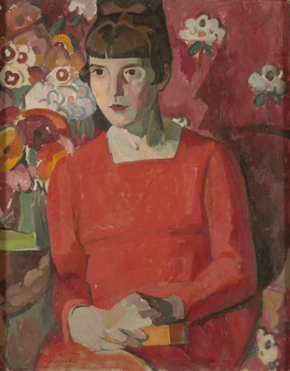Katherine Mansfield: ‘Bliss’
by Andrea Gillies
Portrait of Katherine Mansfield by Anne Estelle Rice, 1918
“What can you do if you are thirty and, turning the corner of your own street, you are overcome, suddenly by a feeling of bliss – absolute bliss! – as though you’d suddenly swallowed a bright piece of that late afternoon sun and it burned in your bosom, sending out a little shower of sparks into every particle, into every finger and toe?…”
Bertha Young has a problem, one that shouldn’t really be a problem. She’s struck, almost invaded, one day by an immense euphoria, and can’t find an outlet for it. That’s the starting point of Katherine Mansfield’s short story ‘Bliss’ which she wrote in 1918, aged 30 herself. She was a New Zealander, and found her own simultaneous fit and non-fit into London society to be fertile ground for writing.
Mansfield’s characteristic approach was to bring an experience of human consciousness into the short story. Nor was she afraid to address the reader directly. We are drawn in. We share in the experience of Bertha’s day – her arrival home, her ongoing battle with Nanny for the love of the baby, and her hosting of a dinner party – such that when Bertha’s thoughts are interrupted, the story breaks off temporarily in ellipses.
Bertha wants “to stand still and laugh at – nothing – at nothing, simply”. There are stream-of-consciousness elements that bring Virginia Woolf to mind, and she was influenced by Mansfield (the admiration was mutual) though after their first meeting Woolf wrote “I’m a little shocked at her commonness at first sight. However, when this diminishes, she is so intelligent and inscrutable that she repays friendship.” After Mansfield’s death Woolf confided to her diary that hers was the only writing she’d ever been jealous about.
Creating a satisfying reading experience in a small space takes a particular skill, and Mansfield has it all: the visual, the conversational and the thing unsaid.”
One of the most seductive things about Mansfield’s work is its mixing up (its parallel tracking) of the two lives, that which is going on inside the mind and that going on outside. Unusually vivid visual details provide the bridge between the two. She had a painter’s eye: “…apples stained with strawberry pink. Some yellow pears, smooth as silk, some white grapes covered with a silver bloom”. She had a poet’s eye: “…in the garden beds, the red and yellow tulips, heavy with flowers, seemed to lean upon the dusk”. In 1918, both had been heightened further, as she said at the time, because she was so very ill (in less than five years she’d be dead, killed by TB). The key thing is balance. Additional to moments of transporting beauty – “a blue dish, very lovely, with a strange sheen on it as though it had been dipped in milk”, items of unromantic domesticity play a role: spoons, bath towels, a conversation about socks. Bertha is also able to laugh at herself: “‘I’m absurd. Absurd!’ She sat up; but she felt quite dizzy, quite drunk. It must have been the spring.”
There are readers who are averse even to the idea of a short story, viewing its glimpse into a situation as something curtailed before it’s properly developed, but a good one is a novel written in a few pages, a miniaturised little universe. In Katherine Mansfield’s case, she takes the idea of the glimpse and plays with that idea: the glimpse suits her purposes. Creating a satisfying reading experience in a small space takes a particular skill, and Mansfield has it all: the visual, the conversational and the thing unsaid; the pepper of hopes, the salt of dashed hopes and the psychology of both, and added to all this, a modernist lack of worry about a 19th-century tying up of loose ends. She discarded the tight stays of her birth century, and was a woman in a loose dress, equipped with an intoxicating kind of fearlessness.
As in all the best stories, the plot of ‘Bliss’ is disarmingly simple. Our heroine’s euphoria coincides with an evening in which she and Harry have people coming for dinner: a couple (the Knights), a young poet called Eddie, and “a ‘find’ of Bertha’s”, Pearl Fulton, who (other than being a blonde) has much in common with V. Woolf in her heavy-lidded quality of stillness, secretive half smiles, disarming sensuality, tilt of head and “cool, sleepy voice”. Bertha thinks that she and Pearl share a moment, one of absolute intimacy, at once spiritual and sexual, looking out at the pear tree in the garden, which is in full blossom and touched by moonlight. Balancing these high feelings, the joy and infatuation, there is social comedy: lively chatter at the table, shared gossip, Mrs Knight’s account of her clothes being mocked on a train. We don’t know who the people are that they talk about, and this adds to the sense of privilege, the privilege of the eavesdropper. There are snippets of chat about writing and the theatre, in which Mansfield gently satirises her own adopted social set. A newly published poem is shared that begins “Why Must it Always be Tomato Soup?” (“It’s so deeply true, don’t you feel?” says Eddie, “Tomato soup is so dreadfully eternal.”)
When Harry hands round cigarettes Bertha sees that, unmistakably, he doesn’t much like Pearl, and this is where things get interesting, where they begin to be metaphorical and to do with the hidden. Bertha’s new sense of herself and her physicality ripens abruptly into a desire for her husband that’s absolutely new. She’s lustful for the first time in her life (perhaps via Pearl, or perhaps for Pearl herself: this remains ambiguous). Just as the dinner party comes to an end, the bliss becomes complex and earthly, leaving the girlish Bertha at the threshold of maturity.
She’s aware of the significance: “‘Good night, good-bye,’ she cried from the top step, feeling that this self of hers was taking leave of them for ever.”
That could easily have been the end of the story. But no: here’s the sting, the soft and startling sting. Accidentally, Bertha sees Harry and Pearl standing together in the hall, as he helps her with her coat. She sees that, unmistakably, they are already in the throes of an affair. The story begins to open, and then just as it begins to open, it closes. A last look at the pear tree reveals only that it’s as stoically lovely as ever, even though bliss has come crashing down. There is no link between feelings and the facts. In the end, ignorance was bliss, and bliss was ignorance.
 Andrea Gillies is the author of Keeper: A Book about Memory, Identity, Isolation, Wordsworth and Cake, winner of the Orwell Prize 2010 and the inaugural Wellcome Trust Book Prize 2009, and the novels The White Lie (2012) and The Enlightenment of Nina Findlay (forthcoming in March 2014), all published by Short Books.
Andrea Gillies is the author of Keeper: A Book about Memory, Identity, Isolation, Wordsworth and Cake, winner of the Orwell Prize 2010 and the inaugural Wellcome Trust Book Prize 2009, and the novels The White Lie (2012) and The Enlightenment of Nina Findlay (forthcoming in March 2014), all published by Short Books.
andreagillies.com
Read ‘Bliss’ at the Katherine Mansfield Society archive. The story is included in Wordsworth Classics’ and Penguin Classics’ The Collected Stories of Katherine Mansfield, Oxford World’s Classics’ Selected Stories and other collections.

